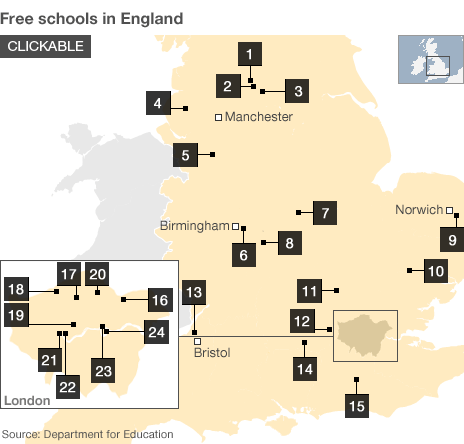Truants' parents could face benefits cut, says PM
- Published
- comments
Prime Minister, David Cameron: "I know this will be a tough measure"
Parents of children in England who regularly play truant could have their benefits cut, Prime Minister David Cameron has said.
The government's social policy review, set up in the wake of the recent riots, has been asked to consider the move, he said in a speech about education.
Discipline and rigour were needed to mend a "broken society", he said.
And parents needed to know there were consequences to their inaction, he added.
Speaking on Friday, Mr Cameron said discipline needed to be restored in schools, and teachers and head teachers were being given the tools to do this.
'Respect'
He added: "But restoring discipline is also about what parents do. We need parents to have a real stake in the discipline of their children, to face real consequences if their children continually misbehave.
"That's why I have asked our social policy review to look into whether we should cut the benefits of those parents whose children constantly play truant.
"Yes, this would be a tough measure - but we urgently need to restore order and respect in the classroom and I don't want ideas like this to be off the table."
Plans to cut benefits payments of parents whose children played truant were brought forward under Tony Blair's Labour government, but were scrapped in 2002.
Instead, penalty notices for truancy were introduced. These can be issued to parents by head teachers, council officers and the police and lead to fines of £50 - doubled to £100 if parents fail to pay up in 42 days.
If these fines remain unpaid for a further 42 days, a prosecution and a fine of up to £1,000 can follow.
Between 2004 to August 2009, 69,436 penalty notices were issued for irregular attendance; 88 were issued for excluded pupils found in a public place during school hours since September 2007.
'Intolerance of failure'
Martin Johnson, deputy general secretary of the Association of Teachers and Lecturers, said: "What is needed to improve pupil attainment is adequate resourcing for all schools, properly qualified and reflective teachers, and continuing funding for family and youth services to support those pupils and families who need it.
"Alienating the parents of persistent truants is not likely to help - these are the parents who need the most support with their children to get them to participate in education and training."
Mr Cameron made the comments at the opening of one of England's first free schools, the Norwich Free School.
He said he wanted to see schools like it "replicated many, many times up and down the country".
Critics have called free schools, which are state-funded but privately run, socially divisive and unaccountable.
The schools are being set up by parents, teachers, faith groups and other organisations.
Some Lib Dems have opposed free schools amid fears they could be socially divisive, but Mr Cameron says both parties are behind the scheme.
"A free school is born of a real passion for education - a belief in its power to change lives.
"It's a passion and a belief this coalition shares. We want to want to create an education system based on real excellence, with a complete intolerance of failure," he said.
Twenty-four out of the first wave of free schools are opening this term.
They operate as academies, and like them, do not have to follow the national curriculum, can vary the pay and conditions of teachers, are directly funded by central government and are outside of local authority control.
'Good citizens'
The government says free schools will meet parental demand in areas where there is a shortage of places, and help drive up standards by providing competition.
But critics argue they will take pupils and money from other schools at a time of cutbacks and could break up the state education system.
Of the 24 free schools opening this month, nine are faith-based or have strong religious ethos, six are parent- or teacher-led and five will be run by trusts already running academies.
Mr Cameron also said that classroom reforms were required to produce a new generation of "good citizens".
He said: "We've got to be ambitious if we want to compete in the world. When China is going through an educational renaissance, when India is churning out science graduates any complacency now would be fatal for our prosperity.
"And we've got to be ambitious, too, if we want to mend our broken society.
"Because education doesn't just give people the tools to make a good living - it gives them the character to live a good life, to be good citizens."
But the National Union of Teachers said the free schools and academies programme was "a divisive and unnecessary experiment".
Its general secretary, Christine Blower, said government cuts were hitting the youth provision and local support services which she said were needed to help ensure young people could reach their potential and be good citizens.
